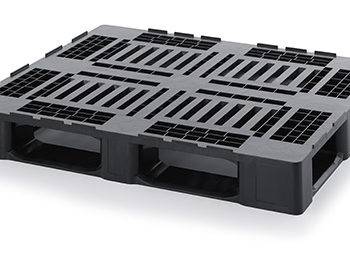When do you require a hygienic pallet?
27 May 2014

The maintenance of high hygiene standards is a vital aspect of production management in the pharmaceutical, food and beverage industries.
Pallets made of all materials have been a standard component of the entire supply chain in these industries in transportation, storage and, increasingly, retail displays. Although the role of the humble pallet has not changed — it has to carry and store a load — hygiene standards in the industries have become ever more stringent.
Manufacturers rely on lightweight pallets to keep a cap on transportation costs during a period of high fuel prices, but the pallet has also to be durable, strong and fit for re-use several times.
The pharmaceutical industry in particular needs highly hygienic pallets that can be used in sterile environments. This type of demand has led to a number of innovations in pallet design.
Contamination Incidents
Wooden pallets remain the staple, even among many pharmaceutical companies. These firms continue to use wood because it is cheaper than replacing their stock with pallets made from plastic or metal. However, a series of incidents in Europe and the United States involving the use of wooden pallets has caused an increasing number of drug companies to switch to a plastic variety.
In May 2011, Johnson & Johnson was forced to recall at least 11,700 bottles containing its HIV/AIDS Prezista drug throughout Europe. Consumers in Austria, Germany, Ireland and the UK reported smelling a very musty odour.
Later scientific tests indicated that a chemical called 2, 4, 6 tribromoanisole, also known as TBA, was the cause of the contamination. This is a chemical created by the breakdown of tribromophenol (TBP) — a chemical used as a preservative and as a flame retardant by wooden pallet manufacturers.
Its decomposition occurs if it is applied to a wooden pallet that is later insufficiently dried before use. The wood then becomes susceptible to fungal growth if it is later exposed to high levels of humidity.
If wooden pallets are stored outside in wet, humid weather or in a poorly ventilated warehouse, they become highly susceptible to fungal growth. TBA itself is highly volatile and recognisable by its musty smell. Traces of this chemical were found on packaging in the Johnson & Johnson case.
Seeking Alternative Pallet Materials
As a result, there has been a far greater scrutiny that ever before of the use of wooden pallets by pharmaceutical companies.
Pharmaceutical companies, and by inference also food and beverage manufacturers, have to exercise extreme care when packaging their products. They need to avoid all types of external contamination, and this means choosing the correct type of hygienic pallet.
Although the wooden pallet remains dominant in Europe and the UK, manufacturers are increasingly opting to buy plastic pallets. Nevertheless, the plastic variety still only accounts for just 10 per cent of pallets used in Europe. But as companies react to any risk of external contamination, the use of these pallets is likely to increase.
New Pallet Designs
New designs of hygienic pallets for use in the pharmaceutical industry mean that they are made of 100 per cent virgin plastic that complies with all European Union safety legislation.
The pallet and its sleeve have to be manufactured with smooth and sealed surfaces. Such surfaces can be cleaned easily and, more importantly, will not absorb any moisture even in the most extreme weather conditions.
The hygienic pallet box is lightweight with a durable and dependable closing and clipping system that ensures the sleeve will remain in place securely. Velcro seals can keep the contents secure during their transportation. Plastic dividers are used to keep products safely inside the container.
This pallet box has provided an ideal solution when it comes to safety and packaging costs. Many components do not require pre-packaging when being stored or transported in these boxes.
Once the pallets and pallet boxes reach the end of their working lifetime, the plastic can be recycled for use in other plastic products.
